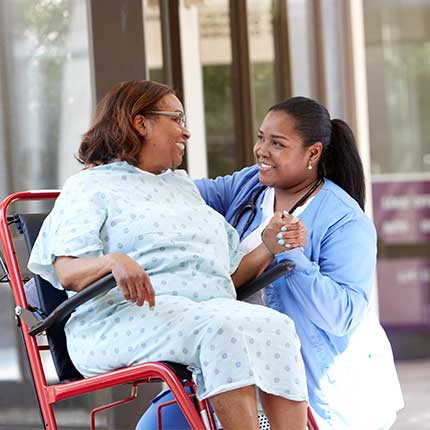Healthy Living: Obstetrics
Newborn Senses
Babies are born with all of the senses — sight, hearing, smell, taste and touch. Some of the senses are not fully developed at birth. The newborn's senses are as follows:
Sight
Over the first few months, babies may have uncoordinated eye movements and may even appear cross-eyed. Stages of eye development:- Babies are born with the ability to focus only at close range — about 8 to 10 inches or the distance between a mother's face to the baby in her arms.
- Babies are able to follow or track an object in the first few weeks of life.
- Newborns can detect light and dark but cannot see all colors. This is why many baby books and infant toys have distinct black and white patterns.
- Focus improves over the first 2 to 3 years of life to a normal 20/20 vision.
Hearing
During pregnancy, many mothers find that the baby may kick or jump in response to loud noises and quiet with soft, soothing music. Hearing is fully developed in newborns.- Babies with normal hearing should startle in response to loud sounds.
- These babies will also pay quiet attention to the mother's voice, and briefly stop moving when sound at a conversational level is begun.
- Newborns seem to prefer a higher-pitched voice (the mother's) to a low sounding voice (males).
- They also have the ability to tune out loud noises after hearing them several times.
- Newborns are screened for hearing while still in the hospital.
Smell
Studies have found that newborns have a strong sense of smell. Newborns prefer the smell of their own mother, especially to her breast milk.Taste
Babies prefer sweet tastes over sour or bitter tastes. Babies also show a strong preference for breast milk and breastfeeding, especially if they are breastfed and then offered formula or a bottle.Touch
Babies are comforted by touch. Here are a few ways to help your baby feel secure:- Place a hand on the baby's abdomen, or cuddle him or her close.
- Swaddling (wrapping snugly in a blanket) is another technique used to help babies feel secure.
- Some mothers find their babies are comforted when "worn" in a sling or carrier.
- Holding a baby for feedings is also important.
- Breastfeeding ensures that a baby spends several hours in mother's arms. Although bottle feeding of breast milk may also be done.
Sign Up for Health Tips
Learn about upcoming events and health topics such as weight, pain, heart and more.


